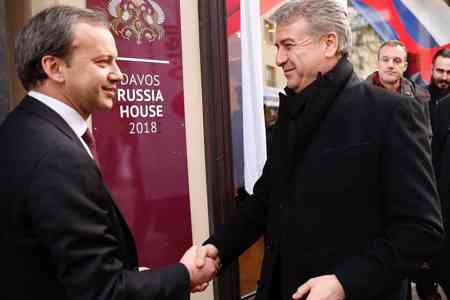


ArmInfo. Prime Minister Karen Karapetyan, who is in Davos, on January 25 held a meeting with Russian Deputy Prime Minister Arkady Dvorkovich.
"Russian Deputy Prime Minister Arkady Dvorkovich discussed the issues of active involvement of Russian business and capital in the free economic zone on the Armenian-Iranian border, as well as related to the activities of the EAEC," Karen Karapetyan wrote on his Facebook page.The sides also touched upon the prospects of cooperation in the field of agriculture, in particular in the livestock sector.
Let us recall that on December 15, the free economic zone of Meghri was opened with the participation of the Prime Minister of Armenia Karen Karapetyan and the Iranian Ambassador to Armenia Seyed Kazem Sajjad. Minister of Economic Development and Investments Suren Karayan said at the opening ceremony that in the coming years it is planned to attract 50-70 companies that will invest in the amount of $ 100-130 million. As a result, 1500 jobs will be created, and the level of exports of goods and services will reach $ 250 million.
Companies operating in the free economic zone of Meghri will be exempt from profit tax, value added tax and excise tax and customs duties. They will only pay income tax. In the free economic zone will be represented by agricultural, processing, trade, transport, travel companies. The total cost of building FEZ in Meghri is estimated at $ 32 million, of which $ 28 million is capital expenditure. The construction of the FEZ on the border with Iran is one of the priority investment programs of the Armenian government and provides for the creation of a free economic zone with an area of 10-15 hectares, with the possibility of further expansion to 45-50 ha.
It is assumed that 100-120 companies will operate there, whose revenues will reach $ 52 million over 10 years. The products are planned to be exported to Iran, the countries of the EEA, the Middle East, Turkmenistan and others. The total investment of all companies for 10 years is planned to increase to $ 350-400 million. The functioning of the FEZ has already been set out in the Customs Code of the EAEC. In total, seven such zones will operate in the system of the duty-free system.